As a human who is clearly keen on a career in medicine, you may have pondered the paramedic vs nurse question before. What is the difference between the two? More specifically: which career path should you follow?
Well, whether you’re about to finish high school OR you’re already in the emergency medical services (EMS), considering a nursing or paramedic program, this guide will provide you with the definitive answers to all of your questions.
We’ll also be looking at things like the amount of training required and work environment, etc., because these considerations are super important when deciding upon a career as a paramedic or a nurse.
So, with that said, let’s get started with a peek at life as a paramedic…
Paramedic Vs Nurse: What Does A Paramedic Do?
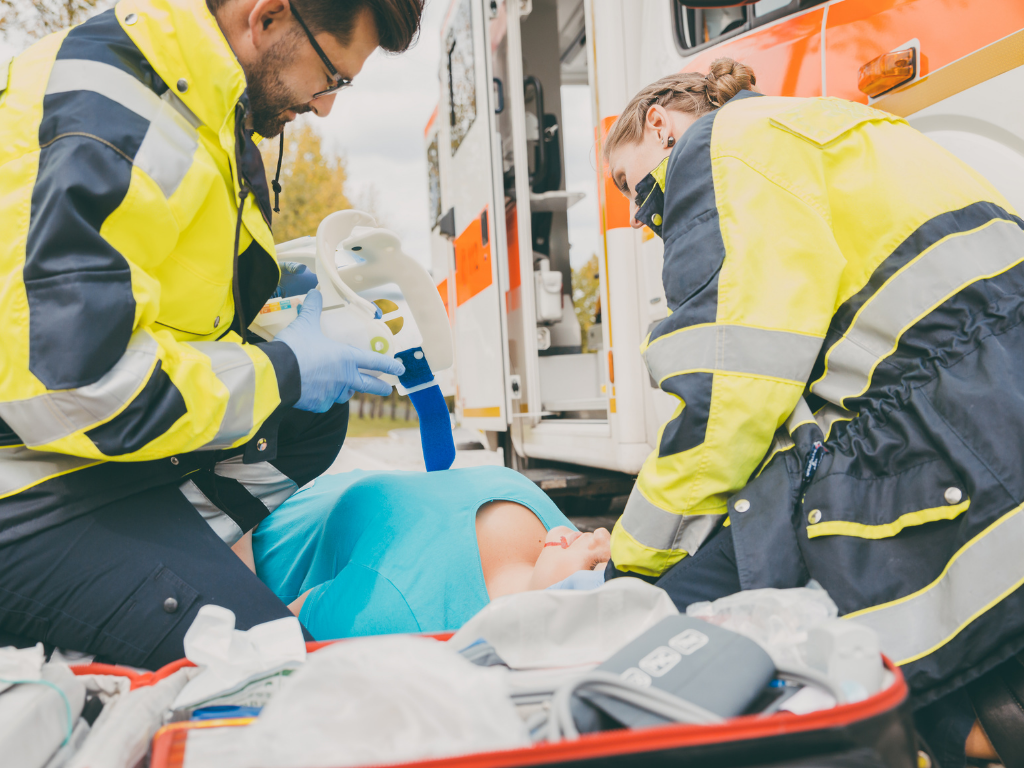
A paramedic is a medical professional who provides prehospital care to people who are in emergency situations involving an acute illness or physical trauma. It’s the paramedic’s job to assess the patient’s condition, with special emphasis on anything immediately life-threatening, like an airway obstruction. They then attempt to stabilize the patient until they can be transported to a hospital or medical facility, where they can receive advanced medical care.
What does a paramedic’s scope of practice look like? They can:
- Administer medications like epinephrine for emergencies such as severe allergic reactions, asthma, or cardiac arrest;
- Perform invasive procedures like intubation and fluid/blood administration; and
- Provide other advanced treatments, such as stabilizing bone fractures, managing strokes, and even bringing patients back from asystole (flat-line).
They can do this for people of all age groups, from newborn infants right through to the elderly.
Now, let’s take a look at what nurses do …
Paramedic Vs Nurse: What Does A Nurse Do?

A nurse is a medical professional who assists doctors, surgeons, and other healthcare workers with the treatment of their patients, typically in a hospital, medical clinic, or other healthcare facility. (There are a few types of nurses, but for the purpose of this description, we’ll be talking about a registered nurse or RN.*)
Nurses are qualified to perform a huge variety of duties, from the less glamorous tasks like bathing patients, dressing wounds, and providing long-term care to the bedridden, to administering medications, collecting samples, performing tests, and checking vital signs.
In fact, nurses are an integral part of the healthcare system because they function as the doctors’ eyes and ears, relaying information about the patient’s condition, symptoms, emotional and physical state, and medical history, without which a doctor wouldn't be able to safely and effectively treat them.
* A registered nurse has completed, at a minimum, an Associate's Degree in Nursing (ASN) or a Bachelor of Science in Nursing (BSN) and has passed the NCLEX, the National Council Licensure Exam.
What Are The Key Differences Between Paramedics And Nurses?
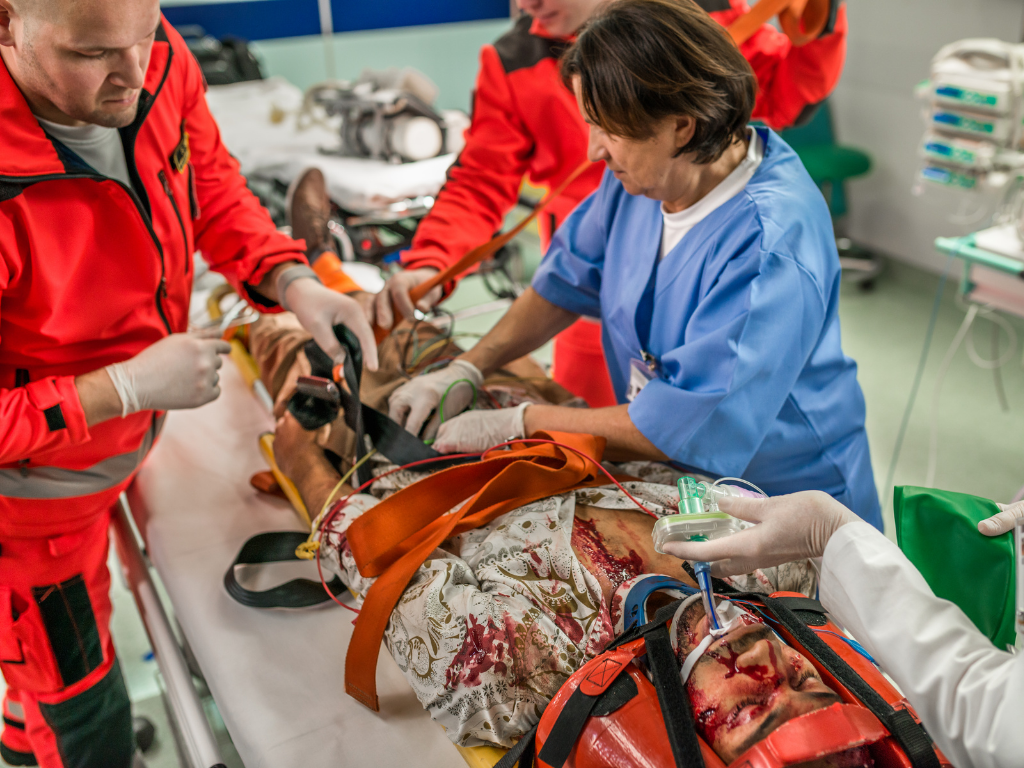
Now that we’ve defined the main responsibilities of paramedics vs nurses, let’s lay it all out on the table so that you can make a more obvious comparison between the two healthcare professionals.
First, it needs to be said that paramedics and nurses have many tasks in common, namely, providing medical care to patients in emergency situations. Both are also required to be incredibly knowledgeable about things like anatomy, pharmacology, management of care, etc., and they need to be able to maintain their cool in seriously stressful situations.
But beyond these essentials, paramedics and nurses are, really, two completely different healthcare professionals, and here’s why …
1. They Work On Different Stages Of Patient Care
Paramedics are responsible for patients’ care from the site of the emergency to the hospital emergency room. Nurses are responsible for patients’ care upon their arrival at the medical facility (and until they’re discharged again), working with doctors and surgeons to develop a treatment protocol.
This fundamental difference between the two treatment environments is important because it affects how paramedics vs nurses are trained. Speaking of which …
2. Paramedics Receive More Practical Training
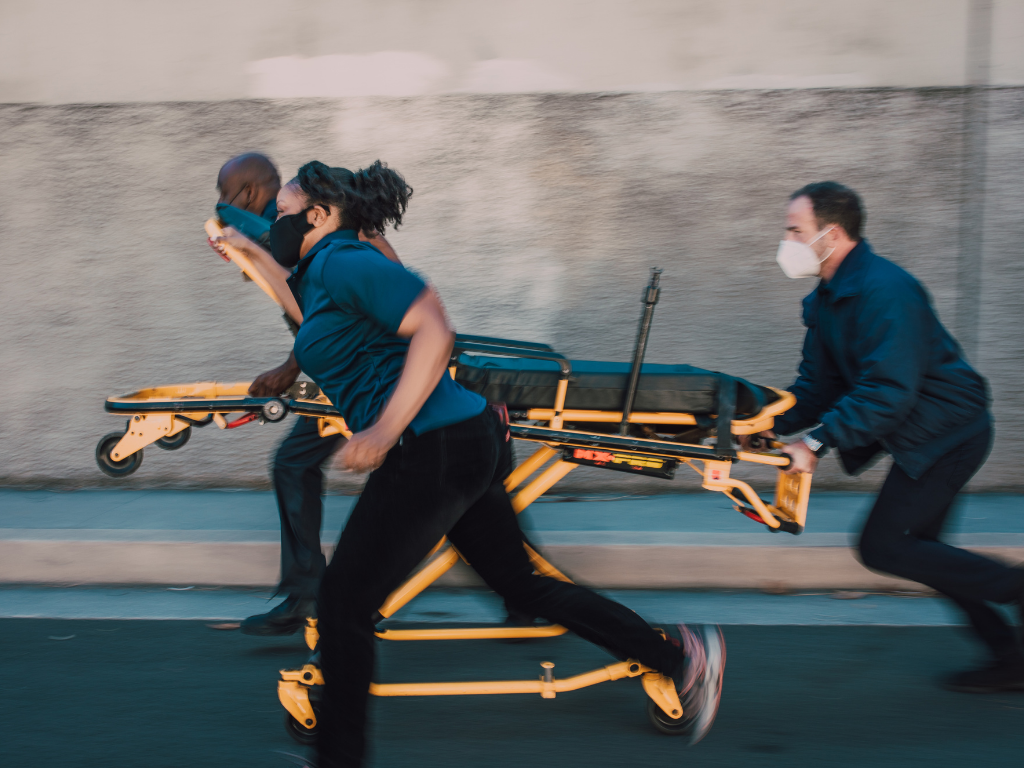
With paramedics, there is a heavy emphasis on practical training and experience. Before you can even embark upon a paramedic program, you have to have at least six months of experience (recommended) as an EMT.
Nurses can go straight from nursing school (which will likely include clinical rotations) and the NCLEX exam to working in a hospital, where they then learn the ropes under the watchful eye of their superiors and work their way up to more complex responsibilities.
3. Paramedic Vs Nursing Education Is Different
Most paramedic programs take between 18 to 24 months to complete, depending on which one you sign up for, whether you study part-time or full-time, and pass everything on the first try. Nursing school, on the other hand, takes 12 months for Licensed Practical Nurses (LPNs) or two to four years for RNs.
This makes paramedics more highly trained than LPNs but less extensively schooled than RNs; although, as explained, paramedics typically have more practical experience going into the job market.
4. Paramedics Vs Nurses Have Different Responsibilities
Paramedics are essentially able, if required, to operate at the level of a doctor in a prehospital emergency situation.
Nurses have a broader range of responsibilities than paramedics (including emergency, convalescent, and outpatient care), but will typically call in doctors for more advanced treatment protocols.
5. They Work Under Different Time Constraints
Paramedics have very little time to assess a patient's condition and address their immediate treatment needs. Nurses also have to respond quickly to emergency situations, but once the patient is stable, they have a little more time to assess any ongoing medical needs.
Additionally, paramedics are typically only with patients for a short amount of time, whereas nurses can provide long-term care that, in some cases (like coma patients), can run on for years.
6. They Work In Different Locations, Under Different Conditions
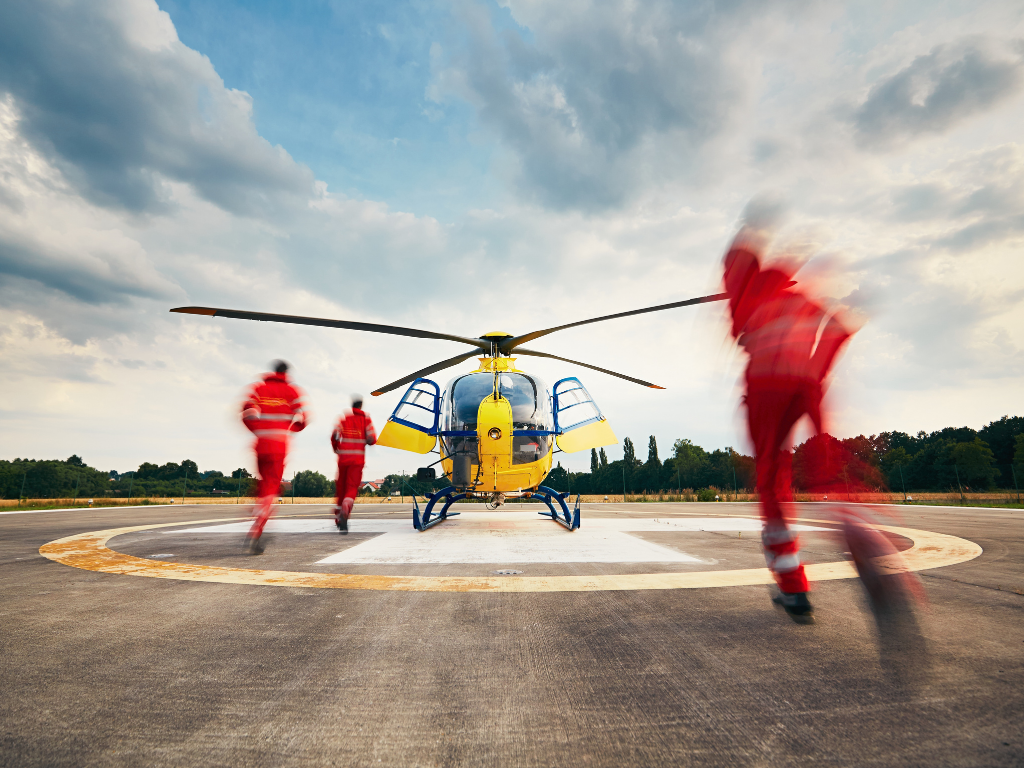
Paramedics, without a doubt, get to work in some pretty cool, remote, and exciting locations, from ambulances, fire trucks, and emergency medical helicopters, to military bases, oil rigs, in SWAT teams, and aboard ships.
On the other hand, their working environments can get pretty rough! From the sweltering wastelands of Afghanistan to the stormy waters of the Atlantic Ocean … wherever there are human lives in danger, you can find a paramedic on standby.
Nurses can also work anywhere a medical healthcare professional is needed, but are more often found in hospitals, medical clinics, long-term care homes, and schools. And, in these environments, you can count on the weather (and other working conditions) being a lot more stable and, well, comfortable!
7. Paramedics And Nurses Experience Different Kinds Of Stress

No amount of verbal dexterity can possibly do justice to the incredible stress present in both worlds: paramedic vs nurse. So, in order to talk briefly about this, you’ll have to forgive the following horrific generalizations in the pursuit of providing usable advice …
In the moment, the pressure on paramedics to provide life-saving interventions is enormous. The working environment itself can be pretty rough, and they have only the most essential tools and medications with which to stabilize a patient.
But once paramedics pass the patient over to a medical facility, they can "relax" until the next emergency rings in. In other words: at the end of the day, a paramedic can return home without the burden of responsibility for a patient’s ongoing condition.
Nurses, on the other hand, care for patients for a longer period of time, so while the stress might be a little less intense, it can last longer, until the patient is showing definite signs of improvement or is discharged.
But then nurses also have the benefit of all the equipment they need to care for a patient, as well as superiors like doctors and surgeons, who can step in if things go pear-shaped.
To sum it all up: if you’re after adrenaline-pumping action, you’ll probably find that more frequently as a paramedic. If you don’t want that kind of punctuated, extreme stress, life as a nurse could be a better choice. But definitely don’t let this be your make-or-break criterion.
Paramedic Vs Nurse: A Final Note
If it’s your goal to do life-saving work, congratulations: you’re spoiled for choice!
Both nurses and paramedics save lives every single day on the job. But which path you ultimately choose to pursue depends on the many variables we’ve discussed in this guide, which should have left you with a pretty sophisticated understanding of the difference between paramedics and nurses.
What next?
If you’ve decided to sign up for a paramedic program, one of the best study tools you can get in your corner is a digital flashcard app like Mochi or Brainscape. Flashcards automate spaced repetition by adjusting the timing at which you return to a concept based on how well you know it. This technique is proven to increase learning efficiency.
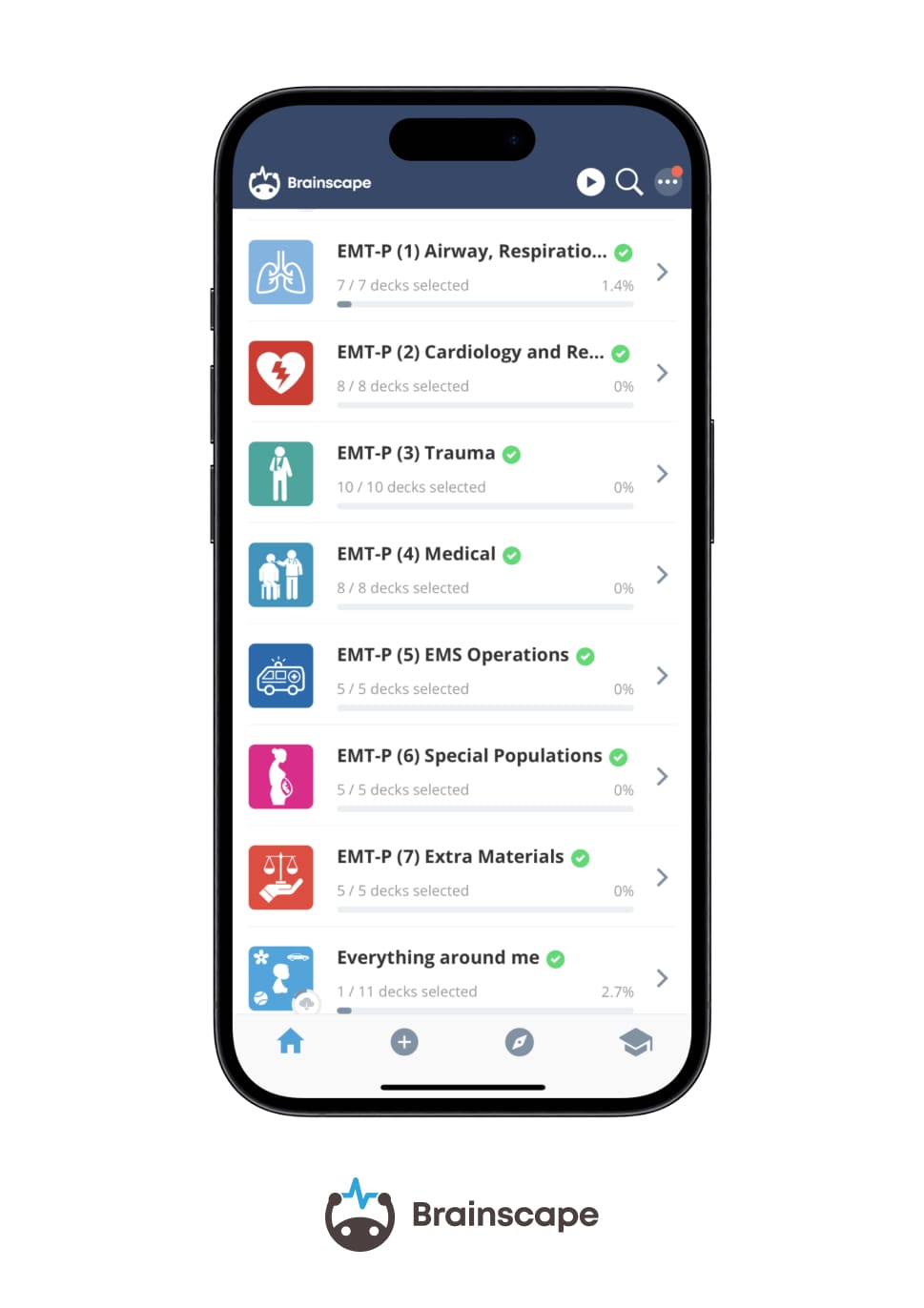
Plus, they engage active recall by requiring you to generate an answer from scratch instead of just recognizing it. This learning technique helps you memorize information more than twice as quickly as traditional learning techniques like reading or highlighting.
So, whether you decide to be a nurse or a paramedic, our advice is the same: equip yourself with a digital flashcard app that adapts to your learning. That way, you'll be able to remember all the knowledge you need, both foryour exams and when a patient needs your expertise!
Additional Reading
- EMT Jobs: how to get one and be successful!
- How To Pass Your Paramedic Training & The NREMT-P Exam
- How to get the best paramedic jobs
References
Karpicke, J. D. (2012). Retrieval-based learning: Active retrieval promotes meaningful learning. Current Directions in Psychological Science, 21(3), 157-163.
Lally, P., & Gardner, B. (2013). Promoting habit formation. Health Psychology Review, 7(sup1), S137-S158.
Lampkin, C. L. (2024). Nurses: Essential to the Health of the Nation. https://doi.org/10.26419/res.00797.001
Unique aspects of long-term care. (2015). Fast Facts for the Long-Term Care Nurse. https://doi.org/10.1891/9780826121998.0001
